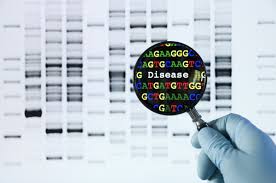Genetic testing is a type of medical test that identifies changes in chromosomes, genes, or proteins. Genetic “tests” analyze human DNA, RNA, chromosomes, or proteins for detecting abnormalities of inherited disorders. Tests can directly examine the DNA or RNA that make up a gene (direct testing), look at markers that are co-inherited with a disease-causing gene (linkage testing), examine the protein products of genes (biochemical testing), or examine the entire chromosome (cytogenetic testing).
Genetic testing has potential benefits whether the results are positive or negative for a gene mutation. In other words, the results of these tests can confirm or rule out a suspected genetic condition or help determine a person’s chance of developing or passing on a genetic disorder.
Several methods can be used for genetic testing:

- Molecular genetic tests (or gene tests) that examine single genes or short lengths of DNA to identify variations or mutations that lead to a genetic disorder.
- Chromosomal genetic tests that analyze whole chromosomes or long lengths of DNA to find out whether are large genetic changes like an extra copy of a chromosome.
- Biochemical genetic tests which study the amount or activity level of proteins; abnormalities in either can indicate changes to the DNA that cause a genetic disorder.
Moreover, genetic tests can serve different purposes that include:
- diagnostic testing
- predictive testing
- carrier testing
- prenatal testing
- preimplantation testing
- newborn screening
Diagnostic genetic testing like other types of diagnostic testing, diagnostic genetic testing confirms or rules out a known or suspected genetic disorder in a symptomatic person.
Predictive testing clarifies the genetic status of an asymptomatic family member at risk for a genetic disorder. Predictive testing always requires that the specific disease-causing mutation first be identified in an affected family member. Predictive testing consists of 2 types: pre-symptomatic and pre-dispositional. Pre-symptomatic testing refers to a genetic test performed on a person who has a family history but has no symptoms of a specific disorder at the time of testing. For instance, Huntington’s disease is a presymptomatic testing in which the gene mutation is present in a healthy individual, symptoms surely occur if the person lives long enough.
For predispositional testing, it can be referred to one of its examples named testing of the BRCA1 gene for breast cancer susceptibility for which finding of a particular gene mutation provides a probability that breast cancer will occur. Predispositional testing differs from predictive testing in that a positive test result does not indicate a 100% risk of developing the condition (eg, breast cancer).
Carrier testing identifies individuals who have a gene mutation for a disorder inherited in an autosomal recessive or X-linked recessive manner.
Prenatal testing determines the genetic status of a pregnancy at risk for a genetic disorder. Risk factors for certain genetic conditions include advanced maternal age, family history, ethnicity, or an abnormal prenatal sonogram.
Preimplantation testing selects early embryos for implantation that have been conceived by in vitro fertilization. Such testing performed at specialized centers determines whether the embryos are free of a particular genetic condition and provides an alternative to prenatal diagnosis and termination of pregnancy.
On the whole, genetic testing has benefits as well as limitations and risks. So, genetic testing is voluntary and people can get help from a geneticist or genetic counselor about the pros and cons of the test and different aspects of testing.
